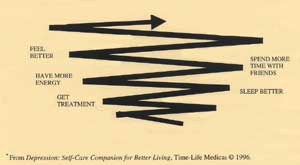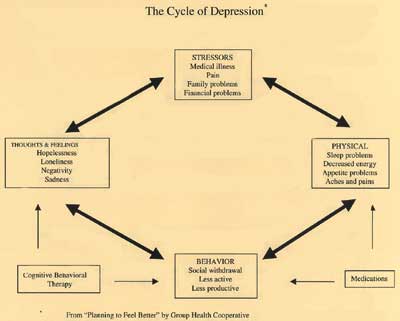Treatment for Depression
The good news is that depression is a treatable condition and many people fully recover. Some people mistakenly believe that depression will go away by itself, that they ought to "snap out of it", that they are too old to get help, or that if they ask for help they are weak. Not true!
Once depression is diagnosed and treated people usually feel much better. Even people who are seriously depressed can greatly improve with treatment. Keep in mind, however, that recovery takes time.
The two most common types of treatment for depression are antidepressant medication and cognitive behavioral therapy (either group or individual). Antidepressant medications change the chemical and electrical messages in the brain, while cognitive behavioral therapy can help improve relationships, manage stress, and increase positive thinking and pleasant activities. The person suffering from depression and his/her doctor/nurse should discuss the treatment options.
It is very important for all depressed persons to participate in their recovery by following their treatment regimens, going to medical and/or therapy appointments, and taking good care of themselves.

CBT therapy and depression
Fortunately, the downward spiral and cycle of depression can be reversed with medication and/or cognitive behavior therapy. With these treatments, persons suffering from depression begin to sleep better, feel more energetic, socialize more, think more realistically, and generally feel better. Most of the exercises in this manual are related to cognitive behavioral therapy. The exercises focus on behaviors that will lead to feeling better (such as doing more pleasant activities) and on improving thoughts and feelings (such as reversing negative thinking patterns that cause feelings of hopelessness).
Who can treat depression?
Some people receive depression treatment from their primary doctor/nurse. Mental health providers, such as psychiatrists, psychologists, and social workers, also treat depression. Psychiatrists are medical doctors who have the same medical training as your doctor, but specialize in mental health. Psychologists are trained to use cognitive behavioral therapies to help people with their depression symptoms. Social workers are trained to help people coordinate their medical care and manage stressful situations, as well as to assist them with other challenges such as finances or housing.
What if antidepressant medications are recommended?
Many new antidepressant medications improve mood, energy level, steep and anxiety problems, and have few negative side effects. Antidepressant medications are not addictive or habit-forming. A doctor/nurse will decide whether a person suffering from depression should take an antidepressant drug.
There are different types of medications to treat depression. If one type does not work, another medication may work better. Therefore, it is very important for persons being treated with depression to notify their doctor/nurse if there are questions or concerns about medication. It is also important to not stop taking a medication without consulting with your doctor/nurse.
How do antidepressant medications work?
Since depression is caused by chemical imbalances, antidepressants work by re-balancing the chemicals and signals in the brain. Besides helping mood, they often help improve sleep, energy level, concentration, appetite, aches, and pains. Antidepressants do not take effect immediately and often take 4-6 weeks to make you feel better.
Antidepressants will not work property if the directions are not followed. Even when the person's mood begins to improve she/he will need to continue the medication at least for some period of time. While it may be tempting to discontinue taking the medication once you are feeling better, do not stop medications without consulting your doctor. Depression may return very rapidly unless it is fully treated.
There are two common types of antidepressant medication.
- Tricyclics/heterocyclics like Amitriptyline, Nortriptyline, or Trazodone have been used for the last few decades.
- Serotonin Selective Reuptake Inhibitors (SSRI) include medications such as Sertraline ("Zoloft"), Paroxetine ("Paxil"), and Flouxitine ("Prozac"). SSRIs often have fewer and more tolerable side effects than other antidepressants.
Treatment for Common Side Effects from Antidepressants
| Side Effect | Solution |
|---|---|
| Dry Mouth | Drink plenty of water. Chew sugarless gum or use sugarless gumdrops to increase moisture to your mouth. |
| Constipation | Eat more fiber-rich foods such as prunes, fresh fruits, bran cereal or whole wheat breads. Take a stool softener. Increase fluid intake. |
| Drowsiness | Get fresh air and take frequent walks. Try taking your medicine earlier in the evening. If you are taking medicine during the day, ask the doctor/nurse if you can take it at night. |
| Wakefulness | Take medications early in the day. Take a hot bath and have a light snack before bed. |
| Dizziness | Get up slower. Drink plenty of fluids. If worried, see your doctor/nurse. |
Antidepressant medication information and tips
- Antidepressants help balance chemicals in the brain.
- Antidepressants are not addictive or habit forming.
- Many people find their sleep and appetite improve first, while their mood, energy, and negative thinking take a few more weeks to get better.
- Antidepressants need to be taken daily
- If you think you are experiencing side effects write down what you think they are and how often they occur. Talk about them with your doctor/nurse.
- Call your doctor/nurse if you are concerned about an unpleasant sensation you think is related to your medication.
- Do not stop taking the medication before you discuss it with your doctor/nurse.
- Keep all medications away from children.
- Call your doctor/nurse if you have any questions about your antidepressant medication.
What can be done about side effects?
Many people who take antidepressants feel side effects before their mood improves. This can be discouraging, but try to wait it out because your symptoms will improve. Side effects often mean that the medication is working.

Side effects often go away within a few weeks and can be managed in the meantime with some simple remedies (see earlier table). If you experience side effects, continue to take your medications as directed, but consult your doctor/nurse immediately. If the side effects are too negative, your doctor/nurse will be able to adjust the dosage or switch you to a different antidepressant.
As the Cycle of Depression diagram shows, difficult or stressful situations can have a major effect on thoughts, which in turn, may affect feelings. Moods are a reflection of thoughts and feelings. Identifying thoughts and feelings can help us understand the way stressful events affect us.
As discussed previously, one way to learn more about how situations affect you is to write down thoughts and feelings you have during a stressful time.
Refer back to the Frame of Mind chart (PDF format, 7k) for strategies for changing your way of thinking.
Anxiety can complicate depression
Many people with depression also experience problems with anxiety. It appears that anxiety and depression are both associated with the depletion of the same chemicals in the brain. Fortunately, many of the same treatments that work for depression also help control anxiety.
Anxiety disorder is much more than the normal anxiety people experience day to day. It is chronic and exaggerated and often does not seem provoked by an external event. Sometimes the thought of getting through the day can provoke anxiety.
Common symptoms of generalized anxiety and anxiety "attacks":
- Feeling keyed up and nervous
- Sweating
- Excessive worry
- Shaking
- Muscle tension
- Feeling light-headed
- Pounding heart
- Sensations of heat or cold
- Tight and painful chest
- A looming feeling of disaster
- Shortness of breath
- Trouble sleeping
Anxiety attacks may make people fear places where there are crowds. Confronting your fears will give you back some power and will help you feel more in control. If you suffer from symptoms of anxiety, discuss them with your doctor/nurse or the nurse practitioner from this study.
